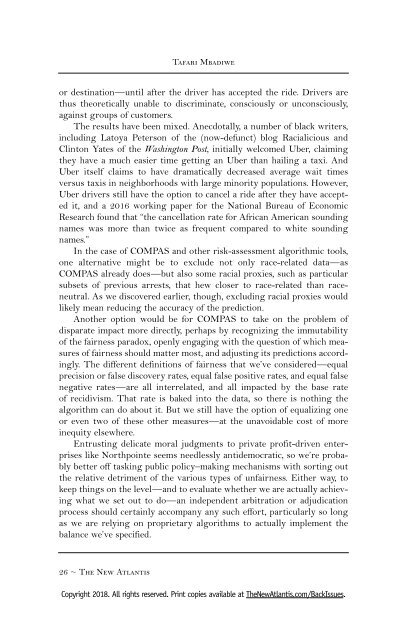The New Atlantis - Winter 2018 (Issue 54) uncompressed with cover
Create successful ePaper yourself
Turn your PDF publications into a flip-book with our unique Google optimized e-Paper software.
Tafari Mbadiwe<br />
or destination — until after the driver has accepted the ride. Drivers are<br />
thus theoretically unable to discriminate, consciously or unconsciously,<br />
against groups of customers.<br />
<strong>The</strong> results have been mixed. Anecdotally, a number of black writers,<br />
including Latoya Peterson of the (now-defunct) blog Racialicious and<br />
Clinton Yates of the Washington Post, initially welcomed Uber, claiming<br />
they have a much easier time getting an Uber than hailing a taxi. And<br />
Uber itself claims to have dramatically decreased average wait times<br />
versus taxis in neighborhoods <strong>with</strong> large minority populations. However,<br />
Uber drivers still have the option to cancel a ride after they have accepted<br />
it, and a 2016 working paper for the National Bureau of Economic<br />
Research found that “the cancellation rate for African American sounding<br />
names was more than twice as frequent compared to white sounding<br />
names.”<br />
In the case of COMPAS and other risk-assessment algorithmic tools,<br />
one alternative might be to exclude not only race-related data — as<br />
COMPAS already does — but also some racial proxies, such as particular<br />
subsets of previous arrests, that hew closer to race-related than raceneutral.<br />
As we dis<strong>cover</strong>ed earlier, though, excluding racial proxies would<br />
likely mean reducing the accuracy of the prediction.<br />
Another option would be for COMPAS to take on the problem of<br />
disparate impact more directly, perhaps by recognizing the immutability<br />
of the fairness paradox, openly engaging <strong>with</strong> the question of which measures<br />
of fairness should matter most, and adjusting its predictions accordingly.<br />
<strong>The</strong> different definitions of fairness that we’ve considered — equal<br />
precision or false dis<strong>cover</strong>y rates, equal false positive rates, and equal false<br />
negative rates — are all interrelated, and all impacted by the base rate<br />
of recidivism. That rate is baked into the data, so there is nothing the<br />
algorithm can do about it. But we still have the option of equalizing one<br />
or even two of these other measures — at the unavoidable cost of more<br />
inequity elsewhere.<br />
Entrusting delicate moral judgments to private profit-driven enterprises<br />
like Northpointe seems needlessly antidemocratic, so we’re probably<br />
better off tasking public policy–making mechanisms <strong>with</strong> sorting out<br />
the relative detriment of the various types of unfairness. Either way, to<br />
keep things on the level — and to evaluate whether we are actually achieving<br />
what we set out to do — an independent arbitration or adjudication<br />
process should certainly accompany any such effort, particularly so long<br />
as we are relying on proprietary algorithms to actually implement the<br />
balance we’ve specified.<br />
26 ~ <strong>The</strong> <strong>New</strong> <strong>Atlantis</strong><br />
Copyright <strong>2018</strong>. All rights reserved. Print copies available at <strong>The</strong><strong>New</strong><strong>Atlantis</strong>.com/Back<strong>Issue</strong>s.


